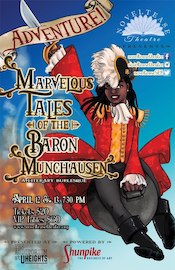How a "literate and literary stripper" is adapting classic fiction for the burlesque stage
Seattle excels at interdisciplinary arts organizations — groups that combine literature with other arts like music (as with the Bushwick Book Club) and theater (The Book-It Theatre.) And for many years, literature has flirted with more risqué arts, in form of the Naked Girls Reading Series (a Chicago-based series which was exactly what it says: naked women reading stories) and several groups that tie together literature and burlesque.
On April 12th and 13th, Seattle's newest literary burlesque endeavor, The Noveltease Theatre Company, debuts a new production interpreting Baron Munchausen into a 90-minute stage show titled ADVENTURE! Marvelous Tales of the Baron Munchausen.
On the phone, Noveltease performer Sailor St. Claire explains that these dancers have a long history of interacting with books. Both St. Claire and Noveltease dancer Polly Wood participated in Naked Girls Reading, and many of the other performers have roots in the city's nerdlesque scene. St. Claire has a doctorate in English literature.
Her academic research developed in tandem with her burlesque career. As she did her academic research, St. Claire says, "there a lot of conversation between my doctoral work and what I was doing on stage. It's interesting to me from a more theoretical perspective to think about what the relationships between pages and stages are." She explains, "I'm so interested in how bodies appear in literature — what we do when we encounter a nude body in a text, and what we do when we encounter a nude body on the stage."
St. Claire says burlesque, which is "a vocabulary of revealing things," is "a great pairing with literature." Just as literary critics and authors who adapt books to other arts have to unravel the deeper meaning of a text, Noveltease's dancers are metaphorically revealing a truth in these stories by revealing more of themselves onstage.
"My branding game is on point, I guess," St. Claire explains, "as a literate and literary stripper." The road to Noveltease began with St. Claire's partnership with the choreographer Fosse Jack. Together, over the past four years, they've interpreted works by Tennessee Williams and Mary Shelley with original choreography.
What can literate audiences who've never attended a burlesque show expect from Noveltease? St. Claire wants to make sure that Seattle Review of Books readers understand that the pairing is not new or unusual. "Burlesque itself is a literary term," she says, which "refers to a specific genre of literature that has satire and comedy and parody in it. And that's also what translated to the burlesque stage in the 1880s and 1890s."
"The work that we do in Noveltease is to elaborate on both meanings of that literary term," St. Claire explains, "to take how burlesque functions within the context of literature, and then how it has functioned in the context of theater, and explore that through contemporary burlesque."
And St. Claire points out that reading itself is an intensely physical act: "I would assume that an audience that is invested in reading is also invested in the visceral and embodied experience that you have when you're reading something that's really good," she says. "We're just externalizing that. We're putting that embodied experience on the stage."
All that sounds serious, but St. Claire adds, Noveltease is "not like a library. You don't have to be quiet. You're allowed to laugh and be audience members." The goal is "to ask people to encounter literature in a new way."
For the moment, Noveltease is going to focus on works in the public domain — partly for legal reasons, but also because "we have this really staid idea of what the classics are — you know, for all intents and purposes they're generally written by old dead white men," St. Claire says. "I think that in doing burlesque versions of stuff written by old dead white men, there's a lot of opportunity to rework and revise the canon and to attempt to take these stories that belong to a particular perspective and make them stories that could belong to other perspectives." She says future outings from Noveltease aspire to resurrect old works so that they "resonate with a modern audience — to actively queer [a text] or actively make it more feminist."
So what's the process of adaptation like? "We'll read the book, we'll think about how it becomes a dance, and then we'll think about how the dance interacts with the words," she says. St. Claire argues that Munchausen's episodic nature made it a great fit with Noveltease.
In the beginning, the group read the book and asked themselves, "what parts of this are burlesque-able?" The performers chose the passages that they most wanted to perform, and then they began editing the text. "This is language from 1785," St. Claire explains, "so a lot of editing is trying to clarify incredibly long sentences full of embedded clauses, so that human beings now could actually get their mouths around them and say them on stage."
Baron Munchausen, in particular, is a text that is ripe for reappropriation. For years after its publication, authors would add new chapters to the story, republishing the original text with a few new passages and claiming the whole book — and its attendant profits — as their own. St. Claire loves that the book has "an interesting history of theft and appropriation and adaptation as a text." Noveltease is adding to that great tradition, building on the book's legacy even as it strips away some of its mysteries.
